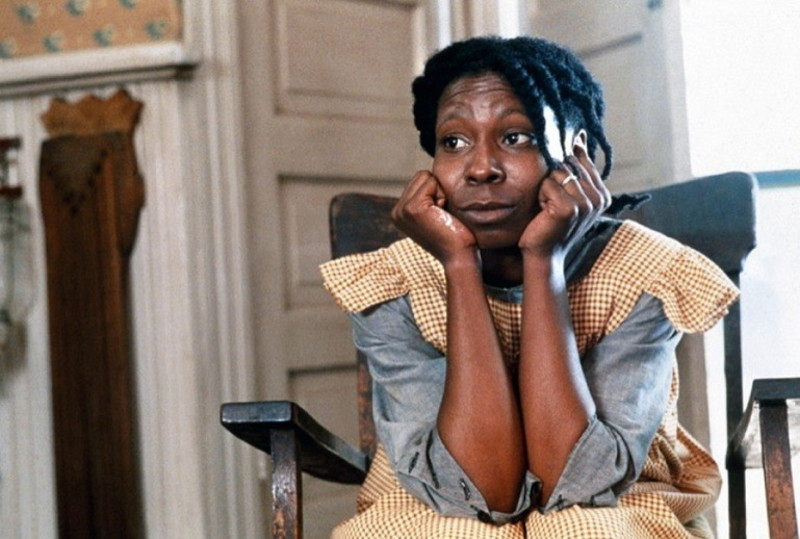Each day during this special week we will be highlighting the filmmakers and actors that Roger championed throughout his career. A table of contents for all of our “Roger’s Favorites” posts can be found here. Below is an entry on actor Whoopi Goldberg.
When Roger saw Steven Spielberg’s 1985 drama, “The Color Purple,” he thought its leading lady, Whoopi Goldberg, gave “one of the most amazing debut performances in movie history,” and was surely destined to be the year’s winner of the Best Actress Oscar. “Goldberg has a fearsomely difficult job to do, enlisting our sympathy for a woman who is rarely allowed to speak, to dream, to interact with the lives around her,” Roger wrote in his four-star review. When the critic interviewed Goldberg that year, he again hailed her portrayal of the film’s heroine, Celie, as “one of the best screen performances I’ve ever seen.” “The way I played Celie,” Goldberg told him, “was to stand back from her. There’s a theory that an actor should identify with the character. Well, I loved her, but I didn’t identify with her. Celie is so far away from me, it was easy to allow her pain to be there, because her life has so little to do with mine.”
“The Color Purple” went on to receive 11 Oscar nominations, but didn’t take home a single prize. Goldberg soon found her talent wasted in a string of insulting would-be blockbusters. By the time she made the instantly forgettable “Burglar” in 1987, it was clear to Roger that her career was being destroyed. In his impassioned one-star review of the film, he claimed that Hollywood didn’t have a clue about what to do with her talent, considering that she was a black woman who looks funny and was a complete original. “They ignore all of those realities about her,” Roger wrote. “It is one thing to argue that casting directors should be color blind, but another thing altogether to cast Whoopi Goldberg in a role so impersonal that it could be filled by Robert Redford, Seka or Rin-Tin-Tin – all without a rewrite.” The critic predicted that if Goldberg continued to be offered vehicles like these, she would soon be branded as “unbankable.” “The system will have chewed up and spit out another talent who suffers from the terrible quality of being unique,” he wrote.
Thankfully, Goldberg would receive another fine role in Richard Peace’s “The Long Walk Home” (1990), which Roger awarded three-and-a-half stars. That same year, Goldberg would win the Oscar for Best Supporting Actress, though it would be for a different film, Jerry Zucker’s “Ghost.” In his second interview with Goldberg, published soon after the nominations were announced, Roger reflected on the irony that Goldberg would be honored for a routine comic role, rather than the “inspired and truly wonderful performance” she gave in “The Long Walk Home.” During their uncommonly candid conversation, Goldberg revealed her frustration at how typecasting had prevented her from being considered for certain roles. “Sad to say, but over the last five years, I have come to the realization that I am black, and somehow that’s supposed to hinder me,” Goldberg said. Then she shared advice that had been given to her from screen legend Bette Davis, “She told me, ‘F— ’em! F— ’em!’ That’s what she said to me. ‘They told me I couldn’t do this, and I couldn’t do that, and f— you, I told them! So Whoopi, f— ’em!’”
In his three-star review of Richard Benjamin’s comedy “Made in America” (1993), Roger wrote thoughtfully about the essence of Goldberg’s tangible yet elusive appeal. “I think it has something to do with a directness of style,” Roger wrote. “There are no false highs and lows in her performances, no flourishes for effect. She seems to respond directly to the situation at hand.” Similarly, in his three-and-a-half star review of Herbert Ross’ “Boys on the Side,” Roger wrote that her performance was “an exercise in restraint: She is wise, grown up and calm. She never reaches for an effect, never goes for a laugh that isn’t right there in her hand, and deals with her character’s lesbianism in a way that can perhaps be called good manners: Yes, she is gay, but she doesn’t believe in imposing her choice on others, and it is only gradually that we realize what the stillness of her heart can contain.” Only after that sentence does Roger mention how her performance also happens to be “very funny.”
Upon revisiting “The Color Purple” in his 2004 Great Movies essay, Roger wrote that Goldberg’s first performance remains her best because “she was allowed to draw from her inner truth and not required to play a sappy or comic role.” He felt that Goldberg’s potential as a serious actress was lost once she started “playing nuns and ‘Star Trek’ characters,” and that Spielberg’s film served as an indelible reminder of the career she could’ve had if Hollywood hadn’t squandered it. The “eventual flowering” of her character Celie provided Roger with “one of the most joyous experiences I have had at the movies; the scene where she is coaxed and persuaded and finally teased into smiling is the turning point of the story, and one of those moments when we see humanity shining out of the screen upon us.”











